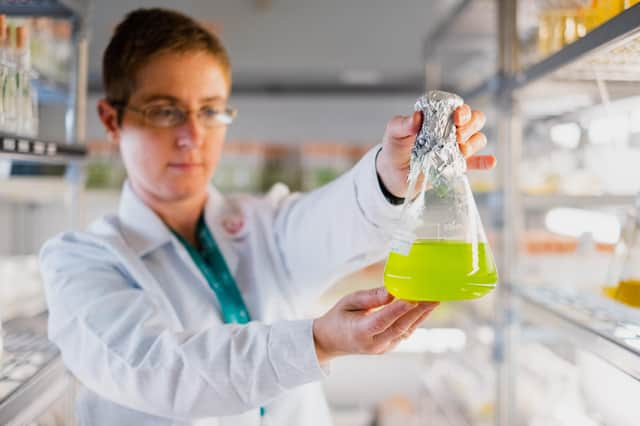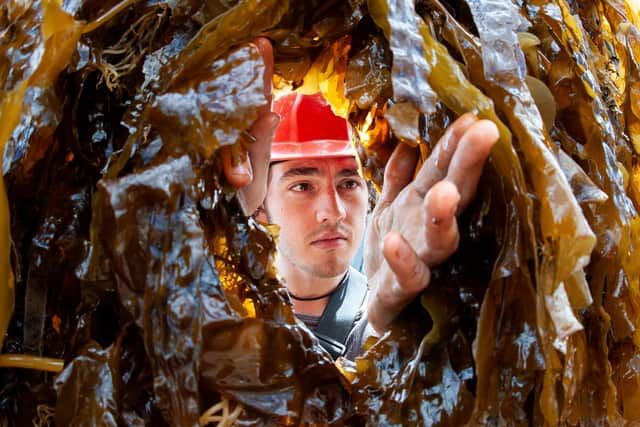Sustainable Scotland: Cutting-edge ‘Amazon for algae’ launches in the Scottish Highlands


It’s one of around 3,000 microscopic organisms held in a collection at the Culture Collection for Algae and Protozoa (CCAP) laboratory, based at the Scottish Association for Marine Science (SAMS) in Oban.
With specimens dating back more than 100 years, this living biological ‘library’ is one of the oldest and most diverse of its kind in the world.
Advertisement
Hide AdAdvertisement
Hide AdNow it has been extended and relaunched with cutting-edge new facilities – including four large bio-reactors – that will help scientists around the world to discover new products and medicines, increase understanding of the natural world in a changing climate and explore the potential for future life in space.
The collection is at the heart of the new Algae Research, Innovation and Environmental Science (ARIES) Centre, which has been set up through a £680,000 grant from the UK Research and Innovation’s Natural Environment Research Council, which also funds the collection’s core running costs.
As part of the upgrade, CCAP has installed specialised equipment to automate extraction of DNA and purify it for genome sequencing.
The team has welcomed the expansion, which they say will strengthen CCAP’s position as the UK’s leading algal centre and will allow for more detailed research into the potential of algae for any number of applications.


Researcher Dr Michael Ross is head of CCAP, which operates rather like an Amazon for algaes – cultivating specimens and sending them out to clients across the globe for a multitude of uses.
“We have thousands of strains of algae that we maintain and supply to the research community and commercial companies, but there remains a wealth of untapped potential to be exploited in these organisms,” he said.
“Scientists around the world are looking for products useful to pharmaceuticals, cosmetics or to the food and beverage industries, and algae are high on the agenda, given their natural diversity and ability to grow in a sustainable way.
“Researchers are also investigating the use of algae as a fuel, in cleaning up environmental pollutants and even their ability to absorb carbon.
Advertisement
Hide AdAdvertisement
Hide Ad“Currently we have limited capability in providing larger amounts of algae and associated genomic and metabolic information to researchers and innovators in the field.
“Essentially, our customers want more biomass, they want to know what it is made of and to find the organism’s full genetic code.
“This investment will allow us to greatly increase sample volumes and to develop a unique ‘one-stop shop’ for environmental and innovative algal research.”
Prof Michele Stanley, associate director for science, enterprise and innovation at SAMS, said: “The field of algal research seeks to address a number of major societal challenges: food and energy security, water availability, ageing populations, increasing carbon dioxide levels and climate change linked to green growth and the blue economy.
“This investment by UKRI NERC in the CCAP-ARIES Centre will underpin the expansion we are seeing both nationally and internationally in this field of science and innovation.”
The centre will collaborate with the new multi-million pound UKRI NERC Environmental Omics Facility to further grow the analytical potential of its service.
SAMS has also this week officially opened its new Seaweed Academy – the UK’s first dedicated seaweed industry facility, offering advice to start-ups, training workers and sharing the latest research to help businesses develop.
Prof Nicholas Owens, director of SAMS, said: “This funding reflects the professionalism and expertise of CCAP and its staff and I am delighted that UKRI NERC has invested in upscaling what is already a key resource in marine science.
Advertisement
Hide AdAdvertisement
Hide Ad“SAMS benefits greatly from hosting CCAP and the new capabilities will enhance our teaching provision, as well as our research, and will allow us to improve knowledge in the emerging seaweed farming industry.”
Dr Iain Williams, director of strategic partnerships at UKRI NERC, said grants were intended to help the UK “deliver world-leading environmental science, support national strategic needs and respond to emergencies”.
He added: “These facilities, which include the Culture Collection of Algae and Protozoa at SAMS, enable UK environmental science to flourish, making the strongest possible contribution to the national agenda and meeting global environmental challenges such as climate change and biodiversity loss.”
Comments
Want to join the conversation? Please or to comment on this article.
